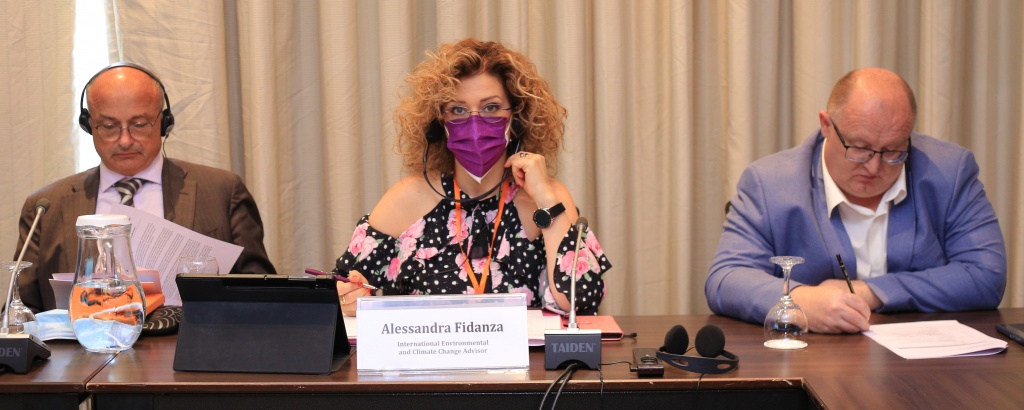 Representatives of Ministries of Foreign Affairs and the parliamentarians of the countries of Central Asia participated in The Fourth Meeting on Climate Change in Dushanbe, Tajikistan, 27 July 2021.
Representatives of Ministries of Foreign Affairs and the parliamentarians of the countries of Central Asia participated in The Fourth Meeting on Climate Change in Dushanbe, Tajikistan, 27 July 2021.
The meeting was attended by the representatives of the legislative and government organizations from Kazakhstan, Kyrgyzstan, Tajikistan, Turkmenistan and Uzbekistan at the level of the ministries of foreign affairs, the Parliaments, the ministries of environmental protection, the international organizations and the foreign embassies.
The participants of the meeting discussed amendments to the legislation, achieved results in the countries as well as the implementation of the Paris Agreement in terms of the legislation, strategic planning and representation of the region of Central Asia in the international negotiation process.
On green legislation
First of all, the participants considered amendments to the legislation and achieved results. Thus, Kazakhstan carries out purposeful work to improve legislation under the commitments of the Paris Agreement.
In particular, the Chairman of the Board of the Kazakhstan Agency for International Development KazAID, Dastan Eleukenov, stated the new Environmental Code came into force in July this year. The Moderator of the meeting, the CAMP4ASB Consultant, Ikrom Nazarov stated that the Regional Environmental Centre for Central Asia (CAREC) contributed to drawing up this document.
The Deputy Director of the Seventh Political Department of Kyrgyzstan Ministry of Foreign Affairs, Atai Namatbaev, stressed the importance of regional cooperation in addressing issues of climate change adaptation. The State Committee for Ecology and Climate of the Kyrgyz Republic was established in May this year to respond to current environmental challenges.
“Tajikistan also keeps on working actively to improve legislation on climate change under the Paris Agreement,” said Yusuf Muhammadrahim, the Chairman of the Ecological Commission of the Majlisi Namoyandagon Majlisi Oli of the Republic of Tajikistan.
Turkmenistan improves the legislative and regulatory framework and environmental protection. This was reported by Azat Seydibaev, the Chairman of the Committee on Environmental Protection, Nature Management and Agroindustrial Complex of the Mejlis of Turkmenistan. According to him, Turkmenistan adopted the Law on Renewable Energy Sources in March this year. Currently, the draft Law on Climate Change is being prepared.
The Deputy of the Legislative Chamber of the Oliy Majlis and the member of the State Committee of the Republic of Uzbekistan for Ecology and Environmental Protection, Islam Khushvaktov, appreciated the valuable experience of drafting environmental legislation of Kazakhstan and Tajikistan. Uzbekistan intends to develop its environmental legislation based on this experience.
It was noted, Uzbekistan significantly contributes to the scientific solutions to environmental problems and supports Uzbek and foreign scientists for their scientific research work. The country continues to implement activities under the strategy for the transition of the Republic of Uzbekistan to a green economy in the period of 2019-2030.
It was reported that the Regional Environmental Centre for Central Asia together with the World Bank initiates a range of political dialogues on the green economy in Uzbekistan from August till December this year; all stakeholders will participate in these dialogues.
On the region within the global context
The international expert on climate change and the environment, Alessandra Fidanza, stressed that the countries of Central Asia acquired enormous potential for environmental legislation, strategic planning and innovative technologies. This is the advantage of the region and it is time to create a brand of Central Asia to present it at both COP26 and UNFCCC.
Central Asia faces many problems caused by climate change. The distribution of water resources is one of them. According to Guy Bonvin, the Special Envoy for Water in Central Asia of the Swiss Agency for Development and Cooperation, on the one hand, climate change poses a risk and on the other hand, it provides opportunities. Cooperation on the efficient use of transboundary water resources among the countries of Central Asia is highly important. Currently, the economy of the region is losing $4.5 billion a year, according to the research of CAREC.
As Guy Bonvin said, 80 per cent of water remains in the region; technical water losses occur in the infrastructure. “As the infrastructure becomes worse, the quality of services worsens too. You may reach the point of no return if no actions will be undertaken. That is why the region needs investments in water infrastructure of the region, and the Regional Environmental Centre for Central Asia performs a pivotal role in this,” he said.
Unfortunately, as Guy Bonvin noted, the Blue Peace Index of transboundary water resources of Amu Darya is 37.3 out of 100 meanwhile Syrdarya’s score is 48.1
Another crucial issue for the region is the use of land resources. Jamal Annagylyjova, Regional Liaison Officer, Central and Eastern Europe, Secretariat of the UN Convention to Combat Desertification, noted that another uniqueness of the upcoming COP26 is a discussion of the impact of land use in reducing greenhouse emissions. In her opinion, reduction in greenhouse emissions should not be considered separately from land resources. Only a quarter of emissions results from agriculture and forestry.
COVID-19 pandemic exacerbates the situation and undermines the achieved results in the region. According to the UNCCD experts, the countries, in most cases, are struggling negative impacts of climate change. However, it is more economically profitable to get ahead of the curve.
Jamal Annagylyjova highlighted the importance of strengthening the global positions of the region within the international agreements that will open up new opportunities.
At the end of the meeting, the participants agreed that only joint actions and regional dialogue will allow achieving positive results and fulfilling commitments assumed under the Paris Agreement. In this regard, the participants expressed gratitude to CAREC for initiating, maintaining, and developing the regional platforms to discuss acute environmental problems of Central Asia.